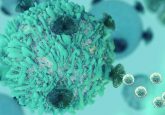PGK1 enzyme – a potential therapeutic target for glioblastoma?
University of Texas MD Anderson Cancer Center (Houston, TX, USA) researchers have demonstrated that the dual role played by phosphoglycerate kinase 1 (PGK1) could present a potential new therapeutic target for glioblastoma.
The Brain Tumor Charity cites glioblastoma as being the ‘most common primary brain tumor in adults’, as well as being ‘the most aggressive form of brain tumor’. The aggressive nature of glioblastomas can often make them appear treatment-resistant.
The enzyme PGK1 regulates cell metabolism and autophagy, a process that plays an important role in cellular stress responses and survival. Studies have demonstrated that PGK1 is involved in the coordination of cancer metabolism- and brain tumor formation-related activities. The enzyme has also been linked to tumor metastasis and drug resistance.
Researchers of this study, published in Molecular Cell, discovered that Beclin1 is affected by PGK1 via phosphorylation. Beclin1 is a protein with a key role in the autophagy process; autophagy is ‘crucial for maintaining cell homeostasis’, allowing tumors to reach important energy sources as well as other cellular components required for tumorigenesis. Authors of the paper write, ‘the precise mechanism underlying autophagy initiation remains to be defined.’
Zhimin Lu (The University of Texas MD Anderson Cancer Center) explained: “Our finding that PGK1 acts as both a glycolytic enzyme and a protein kinase in cell metabolism, autophagy, and cell proliferation greatly enhances our understanding of protein enzymes controlling cellular function. Because it regulates both autophagy and cell metabolism, PGK1 proves its significance in maintaining cellular activities, thus offering a potential new approach for cancer treatment.”
Commenting on the results, Lu stated: “Upregulated tumor-protective autophagy is one of the reasons for cancer treatment resistance. These findings suggest that approaches inhibiting PGK1-regulated autophagy are likely to increase cancer treatment efficacy. Further investigations into this area of research are underway.”
Sources: Qian X, Li X, Cai Q et al. Phosphoglycerate kinase 1 phosphorylates Beclin1 to induce autophagy. Mol. Cell pii: S1097-2765(17)30053-9 (2017);
The University of Texas MD Anderson Cancer Center, News Release www.mdanderson.org/newsroom/2017/02/study-reveals-pgk1-enzyme-as-therapeutic-target-for-deadliest-brain-cancer.html; The Brain Tumor Charity www.thebraintumourcharity.org/understanding-brain-tumours/types-of-brain-tumour-adult/glioblastoma/



